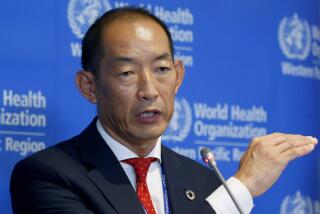Bolton Linked to Firing of U.N. Arms Monitor
President Bush’s nominee to be U.S. ambassador to the United Nations flew to Europe in 2002 to confront the leader of a global arms-control agency and demand he resign, then orchestrated the leader’s firing in a move that a U.N. tribunal has since judged unlawful, according to officials involved.
John R. Bolton, then U.S. undersecretary of state, thought Jose Bustani “had to go,” particularly because Bustani was trying to send chemical-weapons inspectors to Baghdad in advance of the U.S.-led invasion, a former Bolton deputy said.
Bustani said he got a “menacing” phone call from Bolton. The Brazilian was removed by a vote of one-third of member nations at an unusual special session of the U.N.’s Organization for the Prohibition of Chemical Weapons, at which the United States alleged mismanagement and called for his ouster.
The United Nations’ highest administrative tribunal later condemned the action as an “unacceptable violation” of principles protecting international civil servants. The Swiss diplomat who chaired the special session now calls it an “unfortunate precedent” and Bustani a “man with merit.”
“Many believed the U.S. delegation didn’t want meddling from outside in the Iraq business,” said the diplomat, Heinrich Reimann, now retired.
No chemical or other weapons of mass destruction have been found in Iraq.
A Bolton spokeswoman told the Associated Press that the nominee was keeping a low profile during his confirmation process and would have no comment.
Bolton has been criticized for supposed bullying of junior U.S. officials and for efforts to get them fired. Bustani, a senior official under the independent U.N. umbrella, said Bolton used a threatening tone and “tried to order me around.”
In 1997, Bustani became founding director-general of the Organization for the Prohibition of Chemical Weapons, whose inspectors oversee destruction of U.S., Russian and other chemical weapons under a 168-nation treaty banning such arms. The agency, based in The Hague, also inspects chemical plants worldwide to ensure that they are not put to military use.
After U.N. arms inspectors withdrew from Iraq in 1998 in a dispute with the Baghdad government, Bustani stepped up his initiative for inspections, seeking to bring Iraq -- and other Arab states -- into the chemical weapons treaty.
More to Read
Sign up for Essential California
The most important California stories and recommendations in your inbox every morning.
You may occasionally receive promotional content from the Los Angeles Times.









